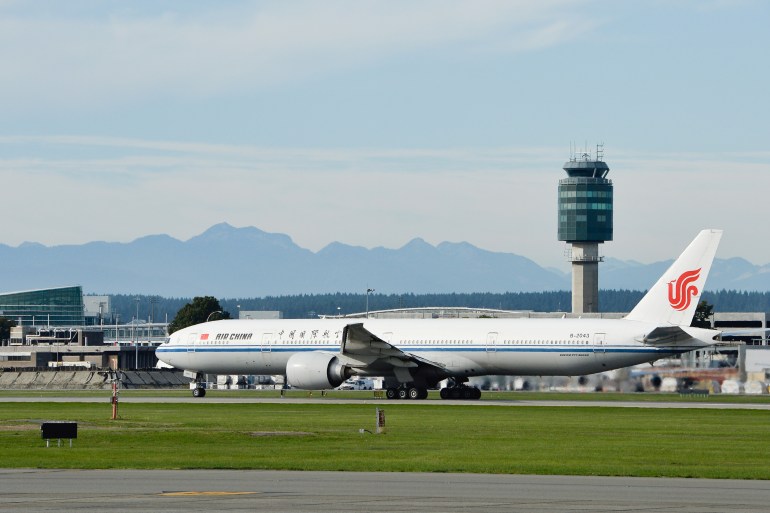The Canadian judiciary has ordered the release of Meng Wanzhou, the chief financial officer of Huawei, who has been under house arrest for nearly 3 years, following a settlement between Washington and the Chinese company.
Shortly after that, Canadian Prime Minister Justin Trudeau announced that the two Canadians, Michael Spavor and Michael Kovrig, who had been detained in China since late 2018, had been released, confirming that they were on their way back to Canada.
Meng, 49, boarded a plane bound for the city of Schengen - according to television footage - shortly after her release under the settlement.
Yesterday, Friday, a Canadian judge ordered Meng's release, ending her extradition proceedings, at a short hearing at the Supreme Court in Vancouver.
This hearing was held in the presence of Meng, a few hours after a settlement was reached between Washington and "Huawei" allowing the chief financial officer of the Chinese telecom giant - who has been detained for 3 years in Canada - to return to China.
The case of Wanzhou has exacerbated the division between Beijing and Washington, while Canada has been caught up in the legal dispute between them.
After the hearing, Judge Heather Holmes said, "I signed the release order."
In the aftermath, Meng held a brief press conference in which she thanked the judge, her family and friends and said, "For the past three years, my life has been turned upside down. It has been a worrying time for me to be a mother and wife" and a corporate employee.
After the ruling, the Canadian Department of Justice confirmed that Meng was "free to leave Canada" and that she had benefited from "procedural fairness before the courts, in accordance with Canadian law."
Meng: Over the past three years, my life has been turned upside down (Reuters)
Concerns and settle
The US judiciary had earlier approved the settlement reached by Washington with Meng.
The settlement provides for the suspension of judicial procedures against her, in order to spare her the charges against her, which led to her detention for 3 years in Canada, which eventually paved the way for her release.
The issue has been a major source of contention in US-China relations, with Chinese officials suggesting it must be resolved to end a diplomatic deadlock between the world's two largest powers.
Meng was arrested at Vancouver International Airport in December 2018 on a US warrant and charged with bank and electronic fraud over allegations that he misled HSBC about the telecoms giant's business dealings in Iran.
The Wall Street Journal earlier reported that the deal could allow Wan Zhou to return to China without facing a prison sentence in the United States.
It is noteworthy that Meng is the daughter of Ren Zhengfei, founder of "Huawei", and was also a member of the Board of Directors of "Skycom".
A plane tracking Chinese Airlines carried Huawei's chief financial officer (Reuters)
Arrest and release
And China - which described its case as "entirely political" - detained - days after Meng's arrest - two Canadian citizens, businessman Michael Spavor and former diplomat Michael Kovrig, on charges of espionage.
And Canadian Prime Minister Justin Trudeau announced - yesterday, Friday - that the two Canadians, Spavor and Kovrig, who had been detained in China since late 2018, have been released, stressing that they are on their way back to Canada.
This came shortly after Meng left Canada for China.
"About 12 minutes ago, the plane carrying Michael Kovrig and Michael Spavor left Chinese airspace, and they are on their way to Canada," Trudeau told a news conference.
"These two men have lived through a horrific ordeal in over a thousand days. They have shown determination (...) and resilience at every step, and they are an inspiration to us all," he added.
"Since this is a process that is currently underway, I cannot share the details" about it, he told reporters.
For his part, US Secretary of State Anthony Blinken praised the Chinese authorities' decision to release the two Canadians after their "arbitrary" detention.
Last August, the Chinese judiciary sentenced Spavor to 11 years in prison, while no decision was announced in the Kovrig case.
Western countries accused China of engaging in "hostage diplomacy" in the two Canadians' case, which brought relations between Beijing and Toronto to an all-time low.

